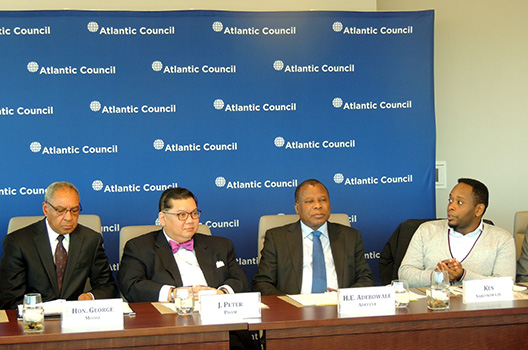 In February, Nigeria’s Independent National Electoral Commission (INEC) postponed the country’s presidential and parliamentary elections, citing the ongoing threat posed by the terrorist group Boko Haram. The presidential polls were rescheduled to March 28; in the interim, the Nigerian military—with the aid of its neighbors—has launched a military offensive against Boko Haram.
In February, Nigeria’s Independent National Electoral Commission (INEC) postponed the country’s presidential and parliamentary elections, citing the ongoing threat posed by the terrorist group Boko Haram. The presidential polls were rescheduled to March 28; in the interim, the Nigerian military—with the aid of its neighbors—has launched a military offensive against Boko Haram.
On Wednesday, March 18, the Atlantic Council’s Africa Center hosted a discussion with His Excellency Professor Adebowale Ibidapo Adefuye, Ambassador of the Federal Republic of Nigeria to the United States, and the Honorable George Moose, Vice Chairman of the US Institute of Peace, Atlantic Council Executive Committee member, and former US Assistant Secretary of State for African Affairs, who led the joint International Republic Institute-National Democratic Institute pre-election assessment mission to Nigeria in January 2015.
 (From left to right: The Honorable George Moose, J. Peter Pham, H.E. Adebowale Adefuye, and Special Assistant to the Nigerian President Ken Saro-Wiwa, Jr.)
(From left to right: The Honorable George Moose, J. Peter Pham, H.E. Adebowale Adefuye, and Special Assistant to the Nigerian President Ken Saro-Wiwa, Jr.)
Africa Center Director J. Peter Pham welcomed guests and highlighted the multinational force’s recent military successes against Boko Haram, recalling that, at an Atlantic Council event last week, the Director-General of Nigeria’s National Intelligence Agency, Ambassador Ayodele Oke, and Nigerian Chief of Defence Intelligence Rear Admiral Gabriel E. Okoi reported that the Nigerian military had freed swathes of territory from Boko Haram control. Pham noted that yesterday brought news of further progress as the international press reported that the group has been pushed from seventeen of the twenty local government areas it once controlled. However, he noted that clearing the insurgents from territory and providing a secure environment for elections were two separate issues.
Adefuye began his prepared remarks by assuring attendees that March 28 elections will proceed as scheduled and that the Nigerian government and people shared a deep commitment to democratic rule. He also noted the importance of INEC and of Nigeria’s independent judiciary in ensuring the transparency and credibility of the elections.
Moose, who led the National Democratic Institute-International Republican Institute pre-election assessment mission to Nigeria, voiced concerns over the election delay. He noted that it provides a pretext for pre- and possible post-election violence by citizens who feel disenfranchised, recalling the contentious aftermath of the country’s 2011 elections that left hundreds dead.
Moose seconded Adefuye’s point that the March 28 elections must go forward as planned, and suggested that Nigeria should now focus on the “mechanics” of running the election, including finishing distribution of the permanent voter cards and ensuring that voting machines are installed and functional at all polling places.
During the ensuing discussion period, Adefuye admitted that the security situation will not allow every Nigerian to vote on March 28, but stressed that the government is trying to ensure that as many as possible—including those displaced by violence—have an opportunity to do so.
Also attending the event and participating in the discussion was Ken Saro-Wiwa, Jr., Special Assistant to Nigerian President Goodluck Jonathan and son of the famed Nigerian environmental activist and human rights campaigner Ken Saro-Wiwa, who was executed by the military dictatorship in 1995.